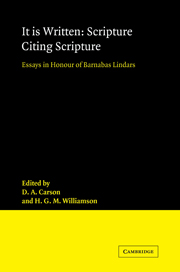Book contents
- Frontmatter
- Contents
- Preface
- Biographical note
- Abbreviations
- 1 An assessment of recent developments
- THE OLD TESTAMENT IN THE OLD TESTAMENT
- BETWEEN THE TESTAMENTS
- THE OLD TESTAMENT IN THE NEW TESTAMENT
- 11 Text form
- 12 Matthew
- 13 Mark
- 14 Luke/Acts
- 15 John and the Johannine Epistles
- 16 The Pauline literature
- 17 Hebrews
- 18 James, 1 and 2 Peter, Jude
- 19 Revelation
- Indexes
19 - Revelation
Published online by Cambridge University Press: 16 January 2010
- Frontmatter
- Contents
- Preface
- Biographical note
- Abbreviations
- 1 An assessment of recent developments
- THE OLD TESTAMENT IN THE OLD TESTAMENT
- BETWEEN THE TESTAMENTS
- THE OLD TESTAMENT IN THE NEW TESTAMENT
- 11 Text form
- 12 Matthew
- 13 Mark
- 14 Luke/Acts
- 15 John and the Johannine Epistles
- 16 The Pauline literature
- 17 Hebrews
- 18 James, 1 and 2 Peter, Jude
- 19 Revelation
- Indexes
Summary
INTRODUCTION
In comparison with the rest of the NT, the use of the OT in the Apocalypse of John has not been given a proportionate amount of attention: merely three books (Schlatter, 1912; Jenkins, 1972; Beale, 1984) and six significant articles have been dedicated to the topic (Vanhoye, 1962; Lancellotti, 1966; Trudinger, 1966; Gangemi, 1974; Marconcini, 1976; Goulder, 1981; cf. also Cambier, 1955 and Lohse, 1961, which are of more limited value).
Otherwise, important discussion of this subject can be found only in portions of books and commentaries, the more valuable of which are Swete (1911, passim, but esp. pp. cxl–clvi), Charles (1920, passim, but esp. pp. lxv–lxxxii), Vos (1965, pp. 16–53), Caird (1966, passim), van der Waal (1971, pp. 174–241), Ford (1982, pp. 243–306), Beasley-Murray (1981, passim), and to a somewhat lesser degree Delling (1959), Comblin (1965), Farrer (1964) and Holtz (1971).
There is general acknowledgement that the Apocalypse contains more OT references than any other NT book, although past attempts to tally objectively the total amount have varied. The variation in statistics is due to the different criteria employed to determine the validity of an OT reference and the fact that some authors include ‘echoes’ and parallels of a very general nature (cf. the survey and evaluation of Vos, 1965, pp. 17–19 and Vanhoye, 1962, pp. 438–40). The range of OT usage includes the Pentateuch, Judges, 1–2 Samuel, 1–2 Kings, Psalms, Proverbs, Song of Solomon, Job, major prophets and the minor prophets.
Information
- Type
- Chapter
- Information
- It Is Written: Scripture Citing ScriptureEssays in Honour of Barnabas Lindars, SSF, pp. 318 - 336Publisher: Cambridge University PressPrint publication year: 1988
Accessibility standard: Unknown
Why this information is here
This section outlines the accessibility features of this content - including support for screen readers, full keyboard navigation and high-contrast display options. This may not be relevant for you.Accessibility Information
- 3
- Cited by
